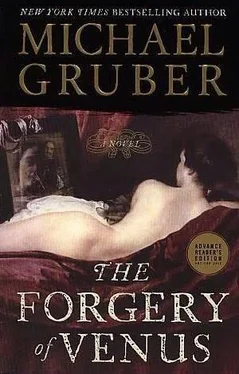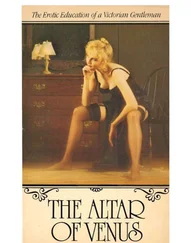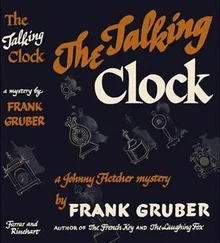
Michael Gruber
The Forgery of Venus
© 2008
So with the faulty image as a start We come at length to analyse and name The luminous darkness in the depths of art: The timelessness that holds us is the same
As that of the transcendent sexual glance And art grows brilliant in the light it sheds, Direct or not, on the inhabitants Of our imagination and our beds. ROBERT CONQUEST, “The Rokeby Venus”
“I’ll lay a bet,” said Sancho, “that before long there won’t be a tavern, roadside inn, hostelry, or barber’s shop where the story of our doings won’t be painted up; but I’d like it painted by the hand of a better painter than painted these.” “Thou art right, Sancho,” said Don Quixote, “for this painter is like Orbaneja, a painter there was at Ubeda, who when they asked him what he was painting, used to say, ‘Whatever it may turn out’; and if he chanced to paint a cock he would write under it, ‘This is a cock,’ for fear they might think it was a fox.” -Miguel de Cervantes, Don Quixote
Wilmot showed me that one, back in college; he’d written it out in his casually elegant calligraphy and had it up on the wall of his room. He said it was the best commentary he knew about the kind of art they were showing in New York in the eighties, and he used to drag me to galleries back then and wander through the bright chattering crowds muttering in a loud voice, “This is a cock.” A bitter fellow, Wilmot, even back then, and it should not have surprised me that he came to a bad end. Whether the story he tells is merely remarkable or literally fantastic I still cannot quite decide. I would have said that Wilmot was the least fantastic of men: sober, solid, grounded in the real. Painters have a rep, of course-we think of van Gogh and Modigliani flaming out in madness-but there’s also stodgy old Matisse and, of course, Velázquez himself, the government employee and social climber, and Wilmot was always, even back in college, on that zone of the spectrum.
Did this all begin in college, I wonder? Were the lines of relationship, envy, ambition, and betrayal set that early? Yes, I believe so, or even earlier. Someone once said life is just high school, on and on, and it does seem that the great of the world are only familiar schoolyard figures-the obnoxious little shit we recall from ninth grade becomes the obnoxious little shit in the White House, or wherever. There were four of us then, thrown together by chance and by our mutual dislike of dorm life at Columbia. Columbia is technically an Ivy League school, but it is also neither Harvard, Yale, nor Princeton, and has the additional misfortune of being located in New York City. This tends to make its undergraduates even more cynical than undergraduates tend elsewhere to be: they’re paying all this money and yet they might as well be attending a suburban community college. And so we were cynical, and affected also a paint-thin coat of sophistication, for were we not New Yorkers too, at the center of the universe?
We lived on the fifth floor of a building on 113th Street off Amsterdam Avenue, across the street from the great futile mass of the unfinished Cathedral of St. John the Divine. I roomed with a fellow named Mark Slotsky, and in the other apartment on the floor were Wilmot and his roommate, a reclusive, pasty pre-med whose name I had forgotten until reminded of it somewhat later in this tale. Aside from the pre-med, the three of us became pals in the manner of students, deeply, but provisionally: we all understood that school was not real life. This was perhaps unusual at the time, the waning days of the great patriarchy, and there was still floating around in the air the notion that this experience would mark one forever, that one would always be “a Columbia man.” This none of us bought, which is what pulled us together as a group, because it would have been hard to find three young louts with less in common.
Slotsky’s parents only appeared at graduation, and I sensed that he might have excluded them then had he been able. They were actual refugees from Hitler, with dense accents, almost parodically overdressed, noisy and vulgar. Mr. S. had made a modest pile as a soft-drink distributor and loudly wondered what items of the college’s property his money had paid for. They seemed, to my eye, oblivious to their beloved college boy’s desire to stay as far away from them as possible, indeed to be mistaken, by reason of dress, speech, and comportment, for another scion of Charles P. Wilmot, Senior.
The name of C. P. Wilmot (as he always signed himself in a thick black scrawl) is not as famous now as it was then, but he was at one time considered the natural heir to the throne occupied by Norman Rockwell. He’d made a rep as a combat artist during the war and had flourished as a delineator of American life in the mass-circulation magazines of the fifties, and at the time of our graduation it was not at all obvious that his profession and livelihood would utterly vanish in the succeeding decades. He was rich, and famous, and happy with his lot.
I should add that upon this graduation day I was an orphan, parents killed on the road when I was eight, only child, raised by a responsible but distant aunt and uncle, and so forth, and therefore I always had my eye out for appropriate father figures. During the various graduation ceremonials I found myself staring at the elder Wilmot with filial lust. He wore on that occasion a soft cream-colored double-breasted suit, with a foulard bow tie and a Panama hat, and I wished I could stick him in a shopping bag and take him home. I recall that the dean came by and shook his hand, and Wilmot told an amusing anecdote about painting the portrait of both the president of the university and the president of the United States. He was much in demand as a fellow who could paint into the faces of world leaders a nobility of spirit not always apparent in their words and deeds.
After the graduation was over, the great man took us three friends and our families to Tavern on the Green, a place I had never been to before and which I then regarded as the pinnacle of elegance rather than what it is, a sort of higher Denny’s with a terrific location. Wilmot sat at the head of the table, flanked by his son, and I was down by the foot, with the Slotskys.
During lunch I therefore learned a good deal about the distribution of carbonated beverages and what little Mark had liked to eat as a child, but what I chiefly recall about the afternoon (and it’s amazing I can recall anything, so generously flowed the champagne) was the senior Wilmot’s voice, rising witty and mellow above the restaurantish murmur and clink; the laughter of the company; and once, the sight of Chaz’s face, illumined by a chance bar of sunlight from the park outside, and its expression as he regarded his father, a look that combined worship and loathing in equal measure.
Or perhaps I am interpolating this based on what I later learned, as we so often do. Or I do. But there can be no doubt about what I am now to relate, and this bears more directly on the veracity of Chaz Wilmot’s remarkable, horrible tale. He was one of those sons who, looking upon their father’s profession and finding it good, set out to match or surpass the old guy’s achievement. He was therefore an artist, and a surpassingly good one.
I first met him in our sophomore year as I was moving in. He happened to be going out while I was struggling up the filthy marble stairs with an enormous suitcase and an over-full grocery carton, and with hardly a word, he pitched right in and helped me with my things and afterward invited me into his place for a drink, which was not beer, as I had expected, but a Gibson, made in a chrome shaker and served in a chilled stemmed glass. My first ever, and it went to my head, as did the appearance somewhat later that afternoon of a lovely girl who removed all her clothes so that Chaz could paint her. I was reasonably experienced in that area for an undergraduate, but this was for me a new and expansive level of the louche-Gibsons and naked girls in the broad light of day.
Читать дальше













